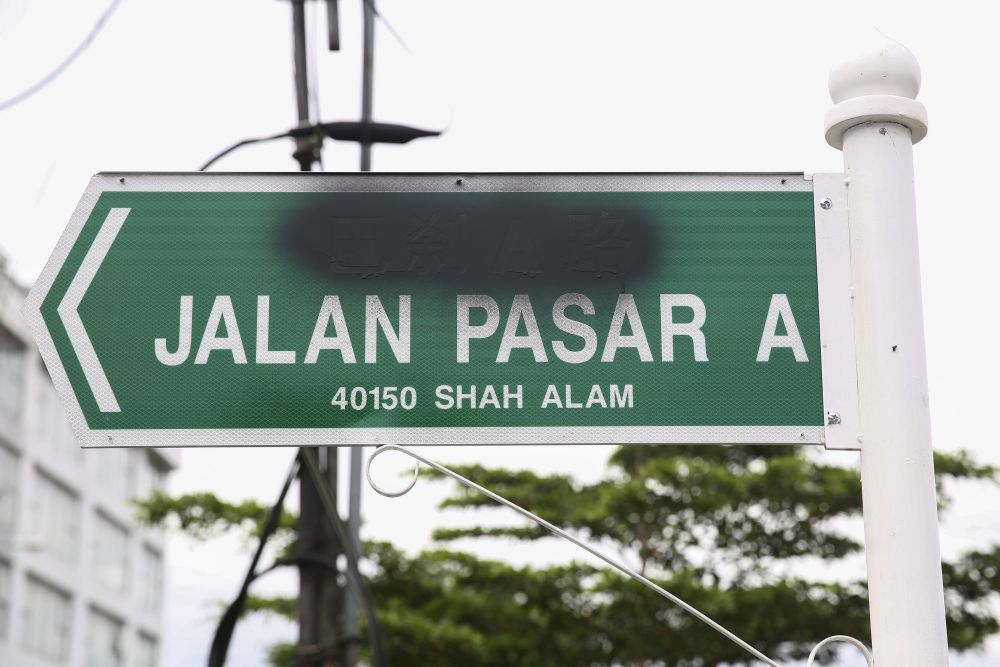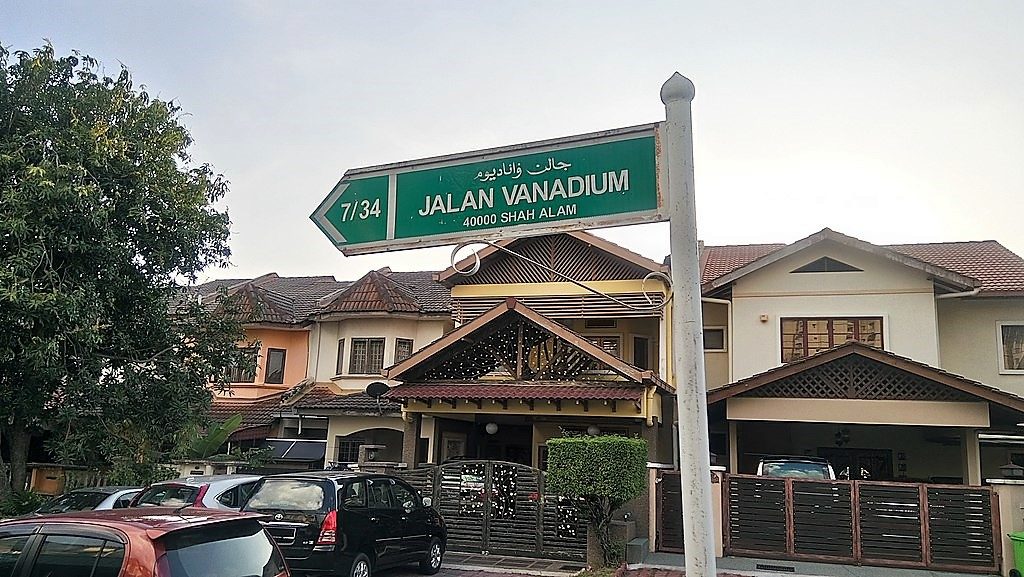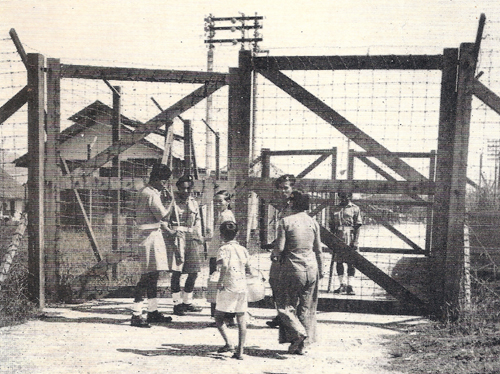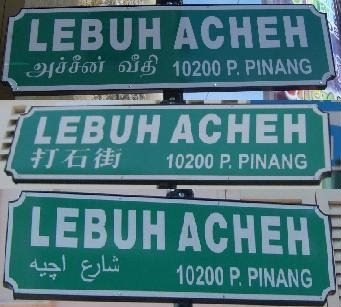AS MALAY HATRED FOR OTHER RACES INCITED BY HIDDEN HANDS OVER ICERD, SUDDEN FOCUS ON CHINESE SIGNBOARDS IN SHAH ALAM – WHICH HAVE EXISTED FOR OVER A YEAR – ATTRACTS SUSPICION
So recently among all the headlines about the ICERD drama and Najib’s revelations about Jho Low and 1MDB, another topic that recently hit the rounds on the interwebz was the Chinese road sign issue in Shah Alam.
It was already generating some controversy when the signboards were first spotted on Twitter, but the poopoo really hit the fan when the Sultan of Selangor Sultan Sharafuddin Idris Shah issued a royal decree to the Selangor govt telling them to remove the signs.
“The sultan has decreed that all road signs which are written in the Chinese language must be removed and replaced with signs in a single language, which is the Malay language. The change must be done immediately and should be completed before the Selangor Sultan’s 73rd birthday on Dec 1,” – Sultan Sharafuddin Idris Shah’s private secretary Mohamad Munir Bani, as quoted by Free Malaysia Today
The issue also led to some road signs being defaced and vandalised:
But here’s the thing tho – when the issue first broke, a lot of you were probably scratching their heads wondering why the poop are there Chinese signboards… in SHAH ALAM?! Well as it turns out…
These bilingual signs have been around for… a year!?
Yep, you read that right. The Selangor Local Government Development Committee had decided in early 2017that Selangor would have bilingual road signs, with BM-Mandarin in the ‘new villages’.
In fact, a total of RM264,443 was put aside for the bilingual road sign plan, with the funds coming from the Selangor state govt themselves and going towards the local councils in charge. Malay-centric traditional villages meanwhile was also given a similar project, with BM-Jawi road signs for them. Both Chinese and Jawi road signs would have the BM name larger tho, since it is after all the national language.
A BM-Jawi road sign in Shah Alam. Fun fact: vanadium is a type of rare mineral. Image from iProperty
Even the current Selangor MB Amirudin Shari has come out to deny that he made the call for the local councils to use dual language signboards in Shah Alam. According to Amirudin , the decision was approved by the previous Selangor govt – meaning a certain Azmin Ali – and on top of that it looks as tho the local councils went ahead with the implementation without going thru the final step of seeking state exco approval.
” I have checked, it was never brought to the Exco (Selangor State Executive Council). But there was a proposal in the meeting of the Permanent Committee on Local Government. That matter was brought (in the meeting) and considered as policy and implemented,” – Selangor Mentri Besar Amirudin Shari, as quoted by Malay Mail
Selangor Mentri Besar Amirudin Shari. Image from Sinar Harian
Azmin tho has denied that he even knew about the Shah Alam dual-language road signs. Meanwhile, the Housing and Local Govt Minister Zuraida Kamaruddin has come out to say that the govt will be looking into the matter to alter and revise the road signs guidelines wherever necessary.
“We will review the matter and come out with more strict guidelines. We have guidelines over the use of language for advertisement boards, but that is different from road signs. We have to further expose the use of Bahasa Malaysia among the rakyat, and I am quite sure almost every Malaysian understands Malay,” – Zuraida Kamaruddin, Housing and Local Govt Minister, as quoted by The Star
Now some of you are probably wondering that with bumiputeras making up two thirds of Shah Alam’s demographics, why put a BM-Chinese road sign there? Well, that’s because there are actually Chinese-majority new villages in it.
What even is a ‘new village’? And why does it matter to the road sign issue?
So the locations in Shah Alam that had these BM-Chinese road signs were new villages such as Kampung Baru Subang. But based on the super large sample size of our office (#ihatecilisos), turns out quite a number of you avocado-eating millennials don’t know what a new village is. And before one of you says it, no, it’s not a village that just got built – far from it too.
Back in the 50s, Malaya was in the midst of a communist emergency. The British at the time were adamant in ridding the country of the communist fighters, and suspected that the rural residents had been secretly supplying the fighters with food and support. As such, their plan to stop this was the Briggs Plan – resettling the Malayan peasants into ‘new villages’, of which about 85% of those resettled were Chinese.
These ‘new villages’ aren’t exactly your high class gated communities with a club house and a nice park. They were gated communities yes, but with barbed wire and police men doing the rounds to prevent anyone throwing food and supplies to any communists outside. There were also curfews enforced as well as communal eating, which is perhaps why some prefer to call these new villages ‘concentration camps’ instead.
In the end, there would be around 450 new villages formed throughout Malaysia, with over 470, 000 peopleresettled into them. Selangor itself would go on to house 77 new villages, with 18 of them having applied to have bilingual road signs early last year. But going back to the question of the dual-language road signs….
Selangor isn’t even the only state to have bilingual road signs
At the end of the day, a road sign is there to help legibility and for people to know where they are or where they’re going. As such, certain states, such as Penang, Johor and Sarawak have bilingual road signs depending on the local council.
In Penang for example, way back in 2008, the Penang state govt caused a minor controversy of sorts when it decided to use multi-lingual road signs. This was due to Georgetown becoming a UNESCO World Heritage Site, with road signs now in BM, English, Chinese and Tamil too. In a weird kinda deja vu, Penang’s road signs were vandalised as well, altho then-Penang CM Lim Guan Eng would defend the road signs.
Three different road signs in Penang with different second languages on it. Image from Putih Hitam Kelabu
On top of that, as for the people actually living in the Shah Alam new villages with the Chinese road signs, they don’t seem to be bothered by it too. A pensioner by the name of Ng Ket Leng, when asked by Malay Mail about the issue, only had this to say:
“I didn’t pay attention to all these. Even if the signboards are here, it’s no use. It’s still difficult to find your way here. This is just a waste of money. When finding routes here is already difficult, writing the road names in Chinese is of no use,” – Ng Ket Leng, Shah Alam resident, as quoted by Malay Mail
So perhaps while the road sign debate might still dominate the headlines, it might be time to look at the actual issues that affect the residents of Shah Alam. And in case you don’t believe people’s voices matter when it comes to road names, you might wanna read the story of how Zoe, a 7-year old girl made a change in New Zealand’s road signs.
Zoe had noticed workers fixing up a powerline on the side of the road with a warning sign that said “Linemen”, and began to ask the question why it said that when women were also on the crew. She would then email the head of the New Zealand Transport Agency, and guess what? The NZ govt would actually decide to change it to “Line Crew”, going to show that sometimes, politicians really do listen to the public, even if it’s just about something as trivial as a road sign.
https://cilisos.my/
✍ Sumber Pautan : ☕ Malaysians Must Know the TRUTH
Kredit kepada pemilik laman asal dan sekira berminat untuk meneruskan bacaan sila klik link atau copy paste ke web server : https://ift.tt/2zqU2kq
(✿◠‿◠)✌ Mukah Pages : Pautan Viral Media Sensasi Tanpa Henti. Memuat-naik beraneka jenis artikel menarik setiap detik tanpa henti dari pelbagai sumber. Selamat membaca dan jangan lupa untuk 👍 Like & 💕 Share di media sosial anda!


























Post a Comment